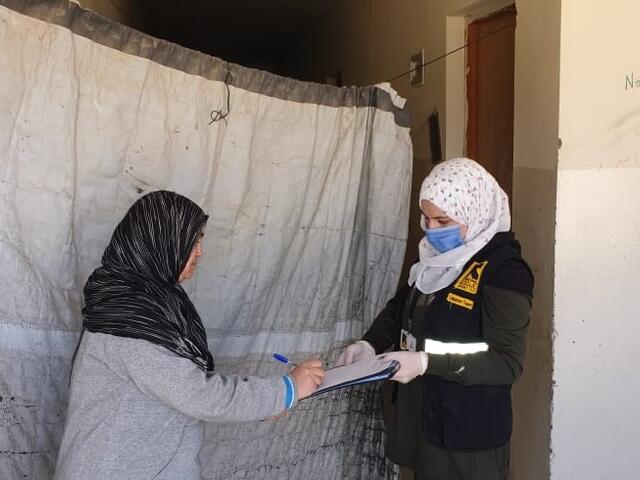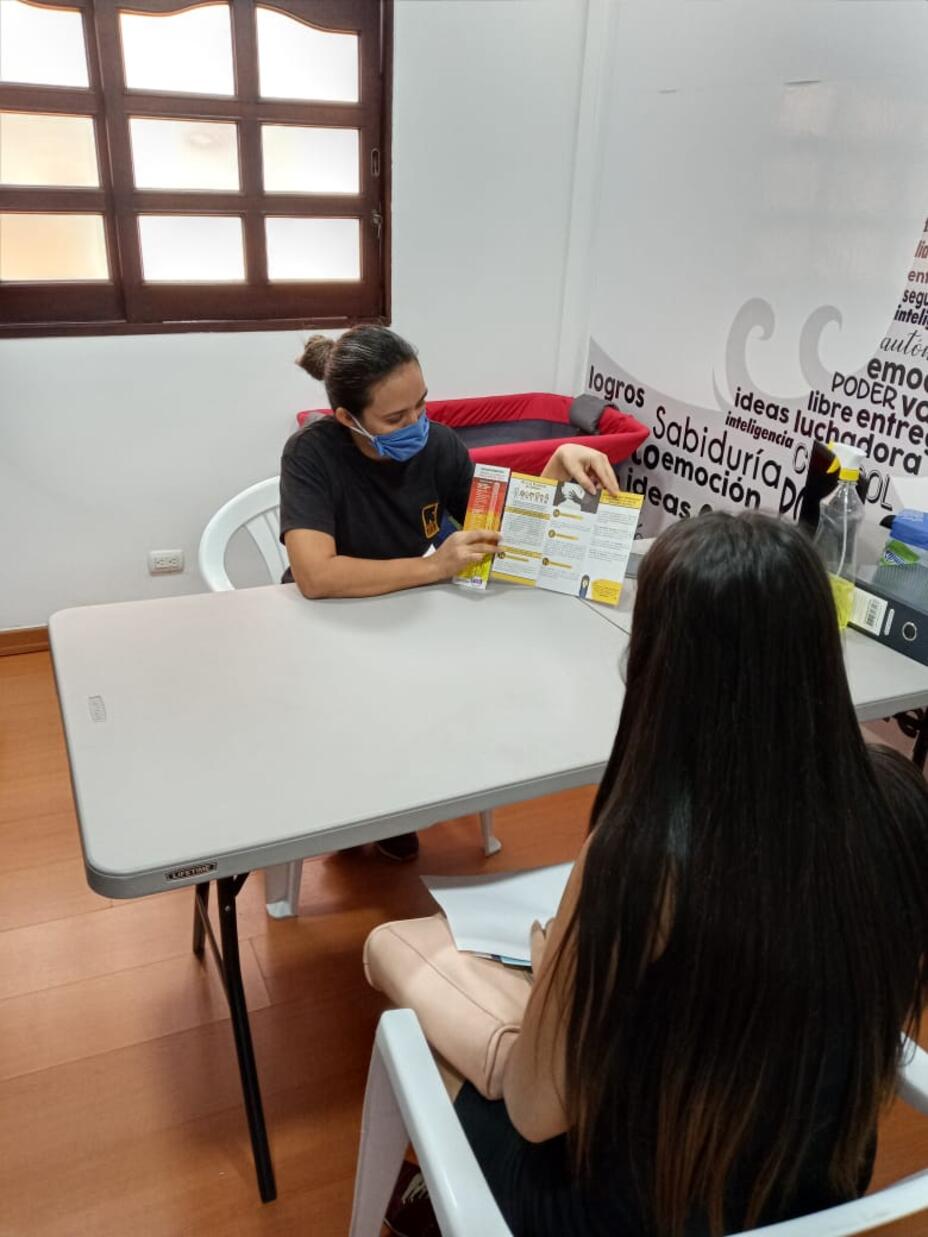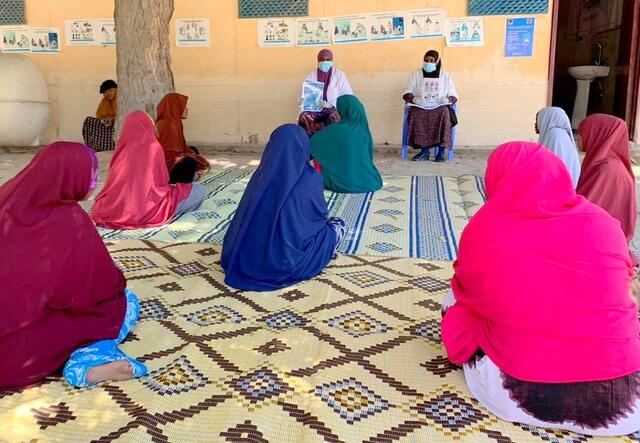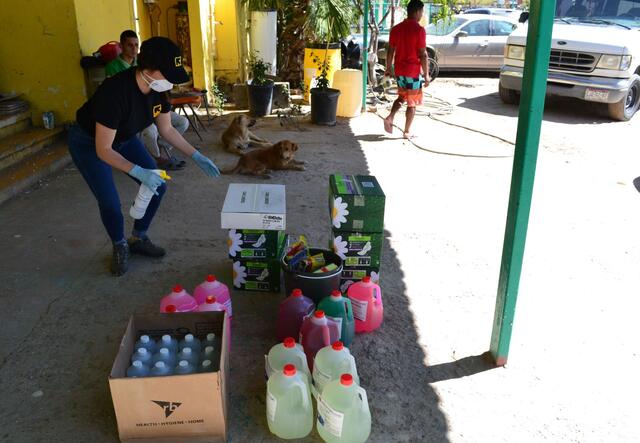Five ways the fight against COVID-19 goes beyond health care
Go inside the IRC’s innovative, lifesaving responses to the global pandemic.
Go inside the IRC’s innovative, lifesaving responses to the global pandemic.
Refugees and people experiencing crisis have been hit especially hard by COVID-19. Beyond the pandemic itself, they suffer more than most from collapsing economies, increased violence against women, and food shortages exacerbated by the virus. Many face a "double emergency" as conflicts and political and economic instabilities add to the impacts of the unprecedented health crisis.
International Rescue Committee (IRC) teams are screening for the virus and treating COVID-19 patients in challenging environments around the globe: We have built isolation and treatment centers in Pakistan and in Bangladesh, home to the world’s largest refugee camp, and our doctors and nurses have set up care facilities directly on the Colombia-Venezuela border to serve stranded Venezuelan migrants attempting to return to their home country. We are also making sure people in refugee camps in Jordan have access to medicine, and we are ramping up mental health support in Tanzania.
While these programs are critical, the IRC’s response to the pandemic goes beyond health care. IRC teams are supporting families struggling to make ends meet, distributing soap and other basic supplies, protecting victims of violence, ensuring children can continue their education, and providing vital information about COVID-19 and its prevention.
Go inside the IRC’s programs to see how a holistic humanitarian response saves lives:
“The most vulnerable are disproportionately impacted,” says Barri Shorey, the senior director of economic recovery and development at the IRC, about the pandemic and its crippling economic impact. “Those refugees who have been able to make progress have been sent back to worry about meeting their most basic needs.”
Of the 10 nations that host the most refugees, only four have measures in place to mitigate the economic fallout from the virus—and even these countries often deny benefits to many refugees.
“People are living in poor conditions in camps,” says Samya Rasam, an IRC midwife working in Yemen. “They need basics like flour and water.” In Sana’a, Yemen, for instance, the cost of basic food items has increased 24 percent. In Colombia, where many Venezuelan migrants have lost their livelihoods, the cost of basic goods has increased 140 percent.

One of the most effective ways the IRC helps struggling families: we give them money. Cash distributions not only are fast and efficient, they contribute to local economies and, critically, allow people to purchase what they need most for their families.
In Yemen, the IRC cash distributions are aiding 281 internally displaced families. Similar programs have reached families in Sierra Leone, Lebanon, Colombia, and other countries.
Another outcome of COVID-19 is the alarming increase in violence against women. Many victims are stuck in quarantine with their abusers and cut off from services they rely on, all on top of the additional stresses of the pandemic.
“Women and adolescent girls, many of whom were already experiencing forms of violence, are now taking on double and triple responsibilities, all in confined spaces, 24 hours of the day,” says Meghan Lopez, the IRC’s regional director for Latin America. “Some are completely stuck with their perpetrators and in increasingly vulnerable situations, without any respite.”
Right from the outset of the pandemic, the IRC recognized the urgency of its commitment to victims of violence. In Uganda, for instance, IRC partner organizations found an innovative way to remotely reach women forced into quarantine with their abusers: verbal passwords. If a victim of abuse repeats the agreed-upon password to their IRC caseworker, the caseworker knows it is not a safe time to talk and re-directs the conversation to other topics. Similarly, a new “phone-beep system” also allows abuse victims to discreetly communicate with their caseworker.

Another noteworthy program focuses on abuse victims in El Salvador, where the Organization of Salvadoran Women for Peace has reported a 70 percent increase in complaints of violence against women. The IRC is providing psychosocial support via digital messaging or phone, one of several creative ways to get information to women who can’t otherwise access services. In addition, at least 287 women suffering from or at risk of violence have received cash assistance to help them access basic needs.
Accurate information is one of our best weapons when it comes to combating the coronavirus. “People are living in fear,” says Yasmin Ara, a refugee residing in the dangerously overcrowded camp in Cox’s Bazar, Bangladesh. As an IRC community volunteer, she goes door-to-door to educate her neighbors about the virus, referring people to medical care when they need it.
“We teach people how to stay safe from the coronavirus,” she says, “that people must wash their hands, avoid crowded places, and go to the hospital if they get sick.”
Yasmin and other IRC staff and volunteers in Bangladesh have reached over 62,000 people with COVID-19 awareness-raising materials. A similar program in Myanmar has reached 1,076. In Pakistan, the IRC has worked with other agencies to support local education programs, including posters and even billboards that have reached an impressive 3,663,396 people.
Information is the best prevention against #COVIDー19. Here is one way @RESCUEorg in Pakistan is working to reach those at risk, alongside trusted outreach within communities. pic.twitter.com/g49IfiD6KV
— David Miliband (@DMiliband) April 1, 2020
In Uganda, when language barriers were hindering government efforts to educate the community from reaching refugees, the IRC hired boda bodas (a local term for motorcycle taxis) to broadcast coronavirus messages over a loudspeaker as they drive through villages. The IRC has used the “Boda Boda Broadcast,” for years to communicate information, but their expansion during the pandemic has been critical to ensuring refugees are not left behind.
“Through the [BBB], I have been able to access messages on food assistance, and services at the protection desks,” says Nelson Kwaje, a community volunteer in Bidi Bidi refugee camp in Uganda who sees the benefits of the Boda Boda Broadcast. “The information on COVID-19 has helped me and my community to observe the preventive measures.”

Providing basic supplies to people in crisis areas is yet another challenge during COVID-19. The IRC’s country director in Colombia describes meeting a group of 200 Venezuelans camping next to a gas station while they attempted to reenter their home country during the pandemic. The migrants, whose numbers included six pregnant women, slept outdoors on cardboard for five days without access to soap or other hygiene products. Luckily, the IRC was able to provide this group with kits containing soap, toothpaste and toothbrushes, toilet paper and towels.
In El Salvador, an IRC team delivered 200 hygiene kits for both men and women recently deported from the United States. In Mexico, where asylum seekers turned away at the U.S. border seek safety in overcrowded shelters, the IRC has provided 16 shelters with a month’s worth of hygiene materials.
The IRC implemented another creative solution to keep asylum seekers safe in Mexico: a “triage hotel” where they can access COVID-19 testing and treatment, as well isolate for 14 days before moving into shelters (often poorly ventilated with only communal dining). The hotel also offers case management to women in a country where they experience high rates of violence.

Education is a lifeline for children during a crisis. When their normal schedules are disrupted, schooling can provide the routine, socialization, and opportunities to build the skills they need to heal and thrive. This is especially true for refugee children who have experienced trauma or are resettling in unfamiliar locations.
That's why the IRC is providing remote learning services to young refugees during the COVID-19 pandemic. For example, in Jordan and Lebanon we are reaching Syrian refugee children through our Ahlan Simsim program, a partnership with Sesame Workshop, providing course materials through online video and WhatsApp.
And in the United States, the IRC’s Ready to Read program in Seattle helps elementary and middle school students who are still learning English continue reading and advancing their skills. Students use Raz-Plus, an online literacy program, to access a library of books categorized by reading level. They join tutors in weekly, 45-minute Zoom sessions to read new books together, build essential literacy skills, practice conversational English, and advance their English language proficiency.
“I was surprised with several of my kids, once I started meeting with them over Zoom, just how much more confident they were with their reading than when I had last seen them,” says IRC tutor Emily Hagen. “This was all from them taking the initiative and reading on their own, just going online and reading as many books as they can.”
These are just a few of the ways in which the IRC is responding to the coronavirus pandemic in more than 40 countries worldwide. To continue this work, the organization urgently needs funding and support. “Our teams are doing an amazing job, but they need to do an even bigger job,” says IRC President and CEO David Miliband. “And for that, we need your help.”
Help us reach families in coronavirus-affected areas worldwide by making a donation today.